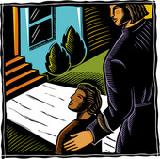|
HOME
Welcome to Social Strides© Speech, Language and Social Thinking.
During this time of Sheltering in Place, both individual and group sessions are available online via Zoom and Facetime!
When possible, in office visits will resume in the San Rafael/Marin County and Redwood City offices.
Social skills, pragmatic language and perspective-taking are primary challenges for persons with Asperger's Syndrome, AdHd, NLD and High Functioning Autism. Our program is designed to positively impact each young person's ability to manage everyday interactions, conversations and relationships, to understand social and contextual cues, to make sense of jokes, sarcasm and figurative language and understand others' perspectives, beliefs, desires and preferences.
|
Does this sound familiar?
Kevin started talking to some kids he saw at the zoo and kept talking to them even though they didn't really look at him.....
Christopher routinely fiddles with his shoes or pencils in class during a lesson. He rarely looks at the teacher, does not look to see what his classmates are doing in order to follow along with the group and does not often volunteer answers to class questions despite knowing the answers.
Macy was hit in the face by a ball while playing soccer. She yelled at the boy who kicked the ball and insisted that the boy did it because he meant to do it.......in fact, she often believes that people do things such as bump into her in line or knock her pencil off her desk on purpose.
Sam's classmates talk to him and greet him when they see him at school, but Sam often acts as though he doesn't know them....
|
 |
| We can help. |
|
Pragmatic Language & Social Cognition Groups ~ Ages 5 through Adult: Group size varies from 2-4 students with sessions scheduled by fall, spring and summer semesters. Enrollment is on-going throughout the year. A minimum commitment of one semester is expected in order to maintain integrity and consistency in therapy for all group participants. The focus is on social thinking (or the "why" behind social skills), related non-verbal and verbal social skills (pragmatic language), self-regulation strategies and understanding social relationships. A detailed description of goal areas can be seen in 'areas of instruction'.
Students are matched and broken into groups according to age, ability and needs. An informal meet/greet or intake evaluation appointment is required for all new students to assist in making a considered placement in group. While each group will be instructed in the basic skill and content areas listed above, the direction and pace of sessions are determined according to individual student needs.
Individual Speech, Language Therapy ~ Ages 5 through Adult:
One on one (or small group) intervention is available for students who require a more intense or individualized approach. The following areas may be focal points of treatment: pragmatic language, social thinking, pronunciation, improvement in attention and focusing, voice and inflection, fluency, grammar, vocabulary and higher order language skills (inferencing, problem solving, predicting, analyzing, figurative language). Students can be enrolled on a month to month basis for individual therapies. Goals can be written for 8 week to one year periods. Individual progress is monitored over time and reviewed at 3 to 4 month intervals.
Assessment ~ Any age:
Formal evaluation can yield valuable information for therapy, however testing is not a requirement for participation at Social Strides. All levels of evaluation are available to include informal summary reports, qualitative assessments and/or formal comprehensive evaluations for purposes of determining service eligibility for public school settings and Individual Education Plan preparation. We collaborate with other professionals/agencies serving your child to determine his or her strengths and needs.
Workshops for Regular Education Students on Understanding our kids ~ grades K to 12:
Have you ever wanted someone to come into your child's school and help classmates understand him or her? Diane Levinthal, director of Strides, is available to speak to your child's classmates or school assembly about the nature of neurodiversity and how to successfully interact and socialize with included peers with social challenges. Teachers, aides and other staff receive training about spectrum and other neurodiverse conditions, but classmates are generally left to wonder what is up with included peers despite the number of hours they spend together in class and on the yard. These talks and demonstrations have been much appreciated by school staff, classmates and the students themselves. Call or email for more information.
|
|